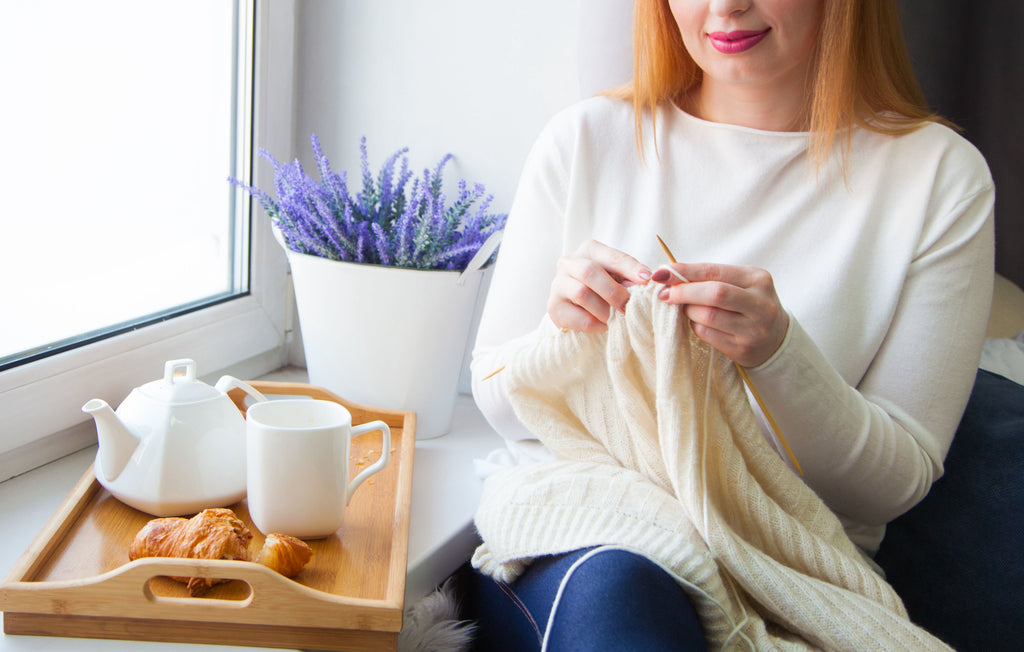The 10 Best Tips for Knitters and Crocheters
No matter if you're new to this hobby or have been at it for decades, there are some pieces of advice that we hold as gold standard. Over the years we have collected best practices from our own trials and tribulations to compile the 10 best tips for all knitters and crocheters.

These best practices are important to keep in mind as you work through a simple scarf or a thoughtful sweater. They will keep you organized and working efficiently so that joy is the foundation of every finished object.
10 Knitting Tips for All Knitters
- Use Stitch Markers
- Always Finish Your Row or Round
- Take Notes
- Pack Away Your Project When You're Done Knitting
- If You Don't Like It, You Don't Have to Finish It
- Keep All Yarn Labeled
- Make a Gauge Swatch
- Check In With Your Work Regularly
- Try New Things
- There is no right or wrong
Read on to learn more about each tip.
1. Use Stitch Markers
Stitch markers might be small but they are mighty! In fact, they're arguably one of the most necessary notions in a knitter's toolbox. Use them to keep track of the beginning of your row or round, identify the right side of your work, break up repeats, and more.
Always use them when the pattern calls for them (it will help you read the pattern better) and any other time they help you to be a more organized knitter.
2. Always Finish Your Row or Round
This is a best practice that every knitter should follow. Stopping in the middle of a row or round can lead to some serious mistakes. You might pick up your work and knit the wrong way in your row (been there, done that!) or forget where you are in the pattern.
Stopping after you've ended a row or round will set you up for success when you come back to start knitting again. You'll know exactly where to start. Which leads us to....
3. Take Notes
When you put down your project, write down where you stopped. I know what you're thinking: I'll remember. But life gets in the way and it's easy to forget. Or your project gets sidelined by another.
It's also a good idea to write down specifics about your project: what size you're making, the yarn information, and what needles you're using. Should you take some time away, these details will come in handy.
4. Pack away your project when you're done knitting
Just do it! Simply setting your project aside when you're finished creates opportunity for curious cats and handsy housemates to move it around and undo some of your work. You might also lose a tool, unwind some yarn, or get your project dirty ( I may never recover from the spot of pink nail polish my tween got on the white stripe of a shawl).
Our advice for all knitters: put all of your supplies back in your project bag, basket, or bin every time you stop knitting. And then, put that project bag, basket, or bin back where it belongs.
5. If you don't like it, you don't have to finish it
There's a chance that at some point you'll start a project and you don't like the colors you picked. Or you don't like the stitch pattern. Or you don't like how the pattern is written. If you're not enjoying what you're making then stop. Knitting something that doesn't bring you joy is simply not worth it.
6. Keep All Yarn Labeled
When you start with a new ball or skein yarn, do not throw away its ball band. And if you do toss your ball band, add one of our Yarn ID Tags to it.
You may need to buy an additional skein of yarn for your project and the ball band will have the brand and color info. Or you may put the yarn back in your stash and need a refesher on what weight it is.
7. Make a Gauge Swatch
When you're making something sized, always make a swatch to determine your gauge. We know; making a gauge swatch - something you're just going to cast aside - isn't the most glamorous part of knitting. But it will keep you from making a garment that's the wrong size, or running out of yarn.
8. Check In With Your Work Regularly
No matter the degree of difficulty, set a time - like every 10 rows - to check in on your work. Count your stitches to make sure you're in sync with the pattern's stitch count. Also, check your gauge - knitting at different times can affect how tightly you're knitting. If you catch a mistake early it's less of a burden to fix.
9. Don't be Afraid to Try New Things
We can't stress this enough: don't be afraid to try new things. It could be as simple as trying an unexpected color or diving into a new skill. If you think a pattern is "too hard," think again. Read through the pattern carefully, watch a tutorial, and take your time. We have every confidence you can do it if you want to do it!
10. There's no right or wrong
It's not uncommon to hear one knitter say to another, "you're doing it wrong." For centuries our hobby has been passed down through families around the world. We all have a way of holding needles and throwing yarn that is distinct to who taught us and how we adapted it to fit our own style. At the same time, we're adopting modern techniques and tools. Our styles may differ, but it's not wrong the end result is a success.
These tips were collected to create a general roadmap for efficient and happy making. Make them your own to suite your own making style or add in one that keeps you focused and on track. We'd love to know what you would add to the list.





3 comments
Many thanks for this reminders and/or new tips. Very helpful🤗🌹
I like to circle all the specifics for the size I’m making. That way I don’t get confused with the correct stitch count, number of increases/decreases, etc. I also make notes on the spot if I’m changing anything, so I don’t forget (especially helpful when I change the decreases on a sleeve). I also leave all of my decrease markers in sleeve1 until I finish sleeve2.
Always put your pattern in with your knitting. You may not get back to your project immediately, life happens. You may forget what pattern your are knitting from or where you put your pattern. Keep all together in one basket or project bag and it will save you hours or days of frustration and searching or yet another project that is ripped out or tossed in the bin.